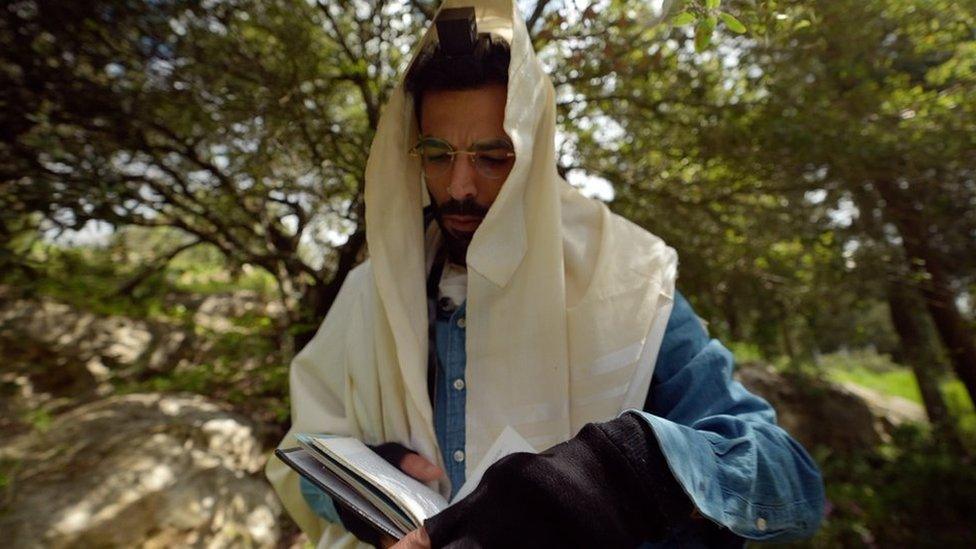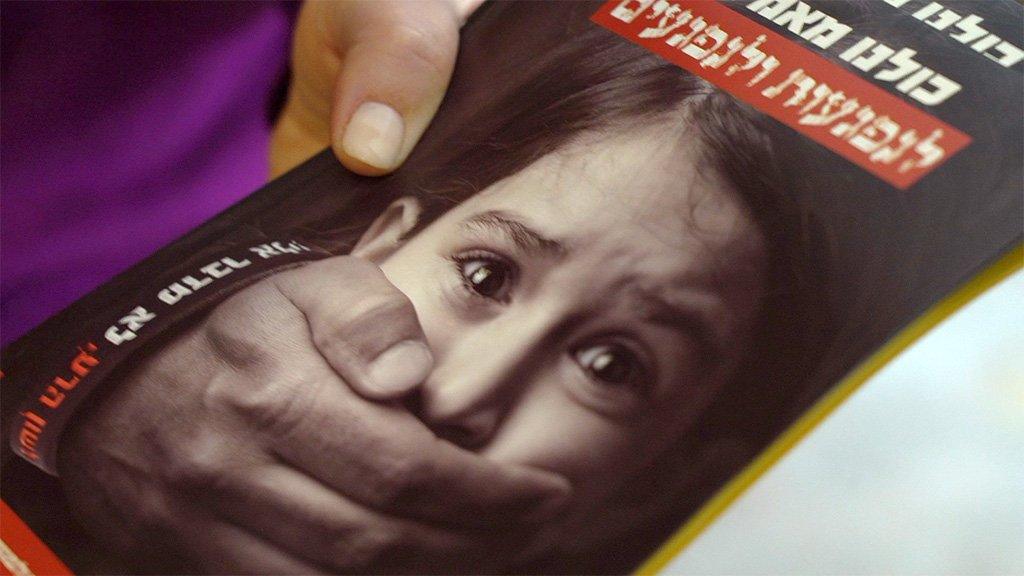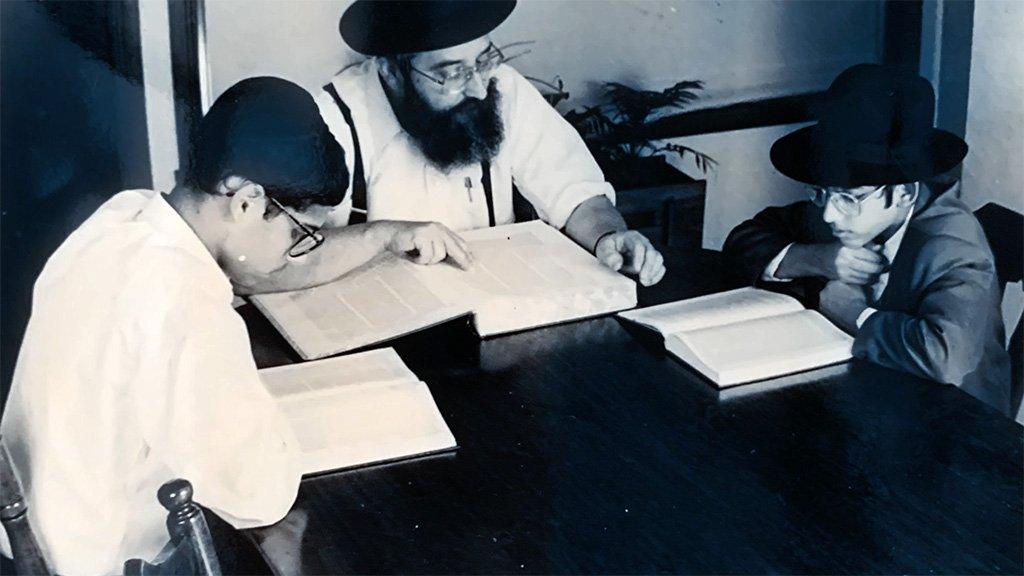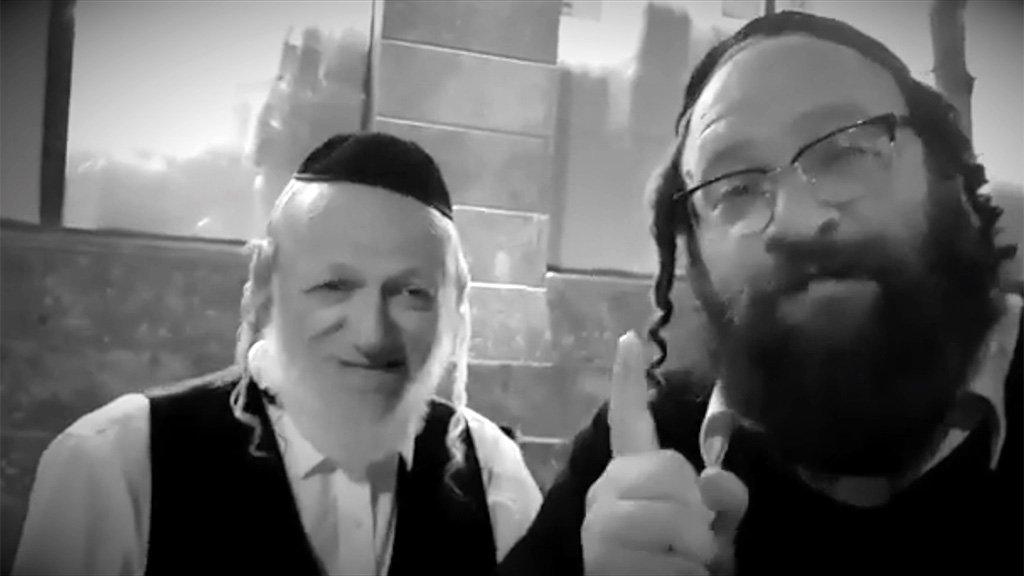Israel: Is this an ultra-Orthodox MeToo moment?
- Published

Shayli Tevel says he was abused throughout his teens by a leading member of the community
When senior ultra-Orthodox Jews in Israel tried to silence or blame victims of sexual abuse who had been allegedly attacked by high-profile men in the community, young people expressed their anger. Some likened the furious response by young haredi Jews - for whom talk of sex is taboo and reaching out to police is often not an option - to the #MeToo movement.
Shayli Tevel weeps as he prays, calling out to God: "Father, I've no energy left to absorb all this."
The former ultra-Orthodox Jew is wearing a white prayer shawl and tefillin - long leather straps with small boxes attached, containing scrolls with verses from the Torah.
After a decade of silence, Shayli, now in his early 30s, has recently broken strict religious conventions and spoken publicly about being groomed and sexually abused between the ages of 12 and 19, by a leading ultra-Orthodox - or haredi - figure.
The man Shayli accuses of abusing him is Yehuda Meshi Zahav, famous in Israel as a social activist and the founder of an emergency rescue service.
"Everyone gave him respect and I wanted to be around him," Shayli says. One of 13 children, Shayli often craved attention and felt flattered to be singled out by Meshi Zahav.
Then, one day, Meshi Zahav offered him a free T-shirt. "When he put [it] on, he put his hand inside my pants."
There is no sex education at Jewish seminaries called yeshivas - like the ones where Shayli received all his schooling - and he found it hard to articulate the abuse to others.
He thought about harming himself. "I didn't want life anymore," he says.
In his early 20s, Shayli did go to the police, but their first investigation of Meshi Zahav was soon closed. "Everywhere I mentioned his name, the door was shut," he says.
But that changed in 2021, just after it was announced that Zahav had won the esteemed Israel Prize - regarded as the country's highest cultural honour. A newspaper published accusations of how since the 1980s, Zahav had been using his status and power to assault women and children.

One of the flyers Avigayl Heilbronn is circulating to her haredi community
Meshi Zahav denied it and after police opened an investigation, he tried to kill himself, ending up in a coma.
But the Meshi Zahav case hasn't been the only recent high-profile sex abuse scandal to have come to light among haredi Jews - who make up about 12% of Israel's population.
Romi Schwartz, now 40, was sexually abused as a child and later raped by children's book author, therapist, and media personality Rabbi Chaim Walder to whom she had turned for help.
"He was like a mentor, a guru. The kids' whisperer," Romi says of Walder. His children's books were found in almost every ultra-Orthodox home.
After her family arranged her marriage at the age of 17, Romi was still having panic attacks from her childhood trauma. Her husband tried to help by arranging therapy sessions with Walder.
Romi says she felt reassured at first. "He said I'm going to be there for you."
But after a year, he took advantage of her trust and the fact she had led a sheltered life. He sexually assaulted her in his book storeroom and later tricked her into going to a hotel, where he raped her.
Romi Schwartz says she was abused by her therapist
Despite her ultra-Orthodox upbringing, Romi now considers herself a secular Jew. She says reporting such abuse to the police would be considered unthinkable by many in the haredi community.
"You don't go to the secular world's authorities, it's forbidden."
It was only late last year, after another newspaper investigation, that a special rabbinical court acted against Walder. The religious court found him guilty of sexually assaulting or raping more than 20 women and girls over decades.
He protested his innocence, but as police began an investigation, he shot himself dead.
It was the subsequent defensive reaction from some senior haredi Jews which drew a furious backlash from others in the community.
Some rabbis and religious media reacted with silence or even by criticising the victims. They accused those who had spoken out against Walder of the sin of slander, even murder. One abuse survivor then killed herself.

If you have been affected by any of these issues in this story you can visit BBC Action Line.

Religious activist, Shoshana Keats Jaskoll, says she and others couldn't believe that Walder was still being defended, and that it was his victims who were being blamed.
She said their reaction prompted an "explosion" of anger and "an absolute revolution in the haredi community".
Avigayl Heilbronn, who describes herself as a modern haredi, is one of a growing number of women trying to raise awareness in a community which shuns the internet.
She and others have been leafleting ultra-Orthodox households across Israel - more than a million flyers have been put through letterboxes. "These are instructions for parents [on] how to talk to their children about sexual abuse," says Avigayl. "We're not only making noise."
The activists liken what is happening to the #MeToo movement. They say it has had a similar domino effect - "with adults and children speaking out about historic and recent abuse by powerful figures - both men and women".
Questions remain, though, about how effectively the most conservative haredi authorities can act against sexual abusers.
"It is still a very long way to go," says Manny Waks - a former haredi Jew and founder of Voicsa, external, an organisation against child sex abuse in Jewish communities around the world.

Manny as a boy (left) studying religion at home
"Because a lot of it is the culture of how the haredi community thinks and no matter what you say or do, the rabbi is everything"
He speaks from bitter experience. He was raised in a tight-knit ultra-Orthodox community in Australia and he and his family paid a high price when he became one of the first to talk publicly about his experience of being sexually abused as a child.
"The head rabbi from the pulpit said no-one has permission to go and speak," he tells me. "My parents were ostracised, excommunicated."
But Rabbi Aharon Boymel - who considered himself a friend of both Zahav and Walder - insists things are changing.
He says rabbinical leaders did not know about abuse by the two men but admits that a culture of shame and secrecy has been "a big problem".
"Once we used to brush this stuff under the carpet. Today there is no such thing. If someone abuses a young boy or girl, immediately we call the police," he says.
But it appears not all is clear-cut.

Rabbi Aharon Boymel and Yehuda Meshi Zahav
"Today I know another story like that of Chaim Walder and Yehuda Meshi Zahav. Big names, important people, they've stopped [the abuse] and gone to get treatment thanks to this story," he says.
Such comments have raised concerns among victims who believe some abusers are still being offered treatment rather than reported directly to the police.
After more than a year in a coma, news broke in June that Yehuda Meshi Zahav - the man who had long tormented Shayli Tevel - had died.
Days later, Shayli searches for his grave in the vast, centuries-old Jewish cemetery on the Mount of Olives. He finds it in a corner reserved for those who killed themselves - seen as a violation of Jewish beliefs.
Shayli prays there alone for a short time. He leaves tearful but relieved.
"It's behind me," he says. "It's painful, but now it's over."
"For everyone who's passed something like that, don't be afraid, whatever happened to you, whatever happened to your child, speak about it," he says.
"It heals you."